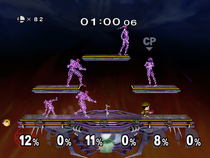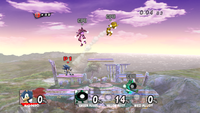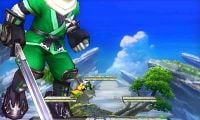Multi-Man mode

Multi-Man-Mode (組み手 Kumi-te, Group Combat) is a mode in Super Smash Bros. Melee as Multi-Man Melee, Super Smash Bros. Brawl as Multi-Man Brawl, and Super Smash Bros. 4 as Multi-Man Smash. This mode pits the player against multiple consecutive foes, challenging them to defeat as many of them as possible while under various pretenses. While the player has only one stock, the enemy team often has a low artificial intelligence level and lacks the ability to perform special moves or grab ledges, and usually have reduced values of varying properties that allow them to get knocked back easily. Multi-Man Melee is a single-player endeavor, whereas Multi-Man Brawl allows for two-player co-op locally or over Nintendo Wi-Fi Connection, and Multi-Man Smash allows for two-player co-op locally in Super Smash Bros. for Nintendo 3DS and up to four players locally in Super Smash Bros. for Wii U.
Multi-Man mode originates from the 10th stage of the 1P Game in the original Super Smash Bros., where player must defeat 30 purple polyhedrons modeled after the original 12 characters, called the Fighting Polygons. These enemies lack the ability to grab or perform special moves, and have reduced weight, power, and tendency to shield or dodge attacks, depending on the difficulty. Later games vary in types of opponents: Melee challenges the player to defeat Fighting Wire Frames, Brawl challenges the player to defeat Fighting Alloys, and Smash 4 challenges the player to defeat the Mii Fighters. In Melee, players face up to five Wire Frames at once. In Brawl, player face up to five Alloys at once in both single-player and co-op modes. In Super Smash Bros. for 3DS, players face up to four Mii Fighters in single-player mode and three Mii Fighters at once in co-op mode, and in Super Smash Bros. for Wii U up to five Mii Fighters at once in single-player mode and four Mii Fighters at once in multiplayer mode.
List of Multi-Man Modes
Introduced in Melee

Players fight the Fighting Wire Frames. The Male Wire Frame's moveset and appearance is based on Captain Falcon, while the Female Wire Frame's moveset and appearance is based on Zelda. All Multi-Man Melee modes are single-player affairs.
- 10-Man, which challenges the player to defeat ten opponents. This is the shortest of all Multi-Man challenges, usually taking between 10 and 20 seconds to complete for an amateur player, though world records are all within roughly 6 and 7 seconds.
- 100-Man, which challenges the player to defeat one hundred opponents. This usually takes a few minutes for players to clear, and can get quite difficult on higher difficulties, when the option exists. The final Wire Frame to be fought will always sustain noticeably less knockback than the others. In all games, clearing 100-Man will give the player an opportunity to face an unlockable character, where victory will result in unlocking the character.
- 3-Minute, which challenges the player to defeat as many opponents as possible within 3 minutes.
- 15-Minute, which challenges the player to defeat as many opponents as possible within 15 minutes. This is arguably one of the most difficult Multi-Man challenges, though simple strategies such as spamming a certain move or evading the opponents altogether will suffice. This mode is removed in Multi-Man Smash.
- Clearing 15-Minute Melee will result in unlocking the Kongo Jungle stage, which originally appeared in Super Smash Bros.
- Endless, which challenges the player to defeat as many opponents as possible before being KO'd themselves. It has no time limit, nor does it have a knock-out limit, unlike other Multi-Man challenges, and as such can go on for an infinite amount of time.
- Cruel, which challenges the player to defeat as many opponents as possible, which now have high handicaps and increased aggressiveness, before being knocked out themselves. It is unarguably the most challenging Multi-Man challenge, as the opponents faced are immensely harder than those who appear in the other modes, and no items appear.
Introduced in Brawl
No new modes are introduced. Players now battle against the Fighting Alloys. The Red Alloy's moveset and appearance is based on Captain Falcon, the Blue Alloy's based on Zelda and Zero Suit Samus, the Yellow Alloy's based on Mario, and the Green Alloy's based on Kirby and Jigglypuff. Multi-Man Brawl allows for two-player co-op locally or over Nintendo Wi-Fi Connection.
- Every 25th opponent fought is spawned as a character, and the final opponent is a palette swap of the player's character.
Introduced in Smash 4
Removes 15-Minute mode. Players battle against the Fighting Mii Team. Multi-Man Smash allows for two-player co-op locally in Super Smash Bros. for 3DS and up to four players locally in Super Smash Bros. for Wii U. However, the mode cannot be played over Nintendo Network on either version.
- Rival, which challenges the player to defeat more opponents than their Rival (a clone of their character) before they are themselves defeated in an otherwise endless match. Rivals respawn after being KO'd. The player's final score is equal to the difference of number of opponents they and their Rival defeated. This is the only Multi-Man mode in the game that does not allow multiplayer.
- Every 50th opponent fought is spawned as a giant character, and the final opponent in 100-Man Smash is a giant version of the player's character.
- A special version can occur as a final battle in Smash Run, where the Mii Fighters along with metal and giant metal versions of the player character appear.
Items
Prior to Smash 4, items spawn normally in Multi-Man modes. However, the items listed below are disabled from appearing. While the specific reasons are unknown, among the disabled items are all the healing items as well as most powerful items such as the Hammer or Dragoon, so it is likely to make the mode more challenging for players.
- Hammers
- Heart Containers
- Maxim Tomatoes
- Food
- Golden Hammers
- Dragoon Parts
- Sandbag
- Containers (except for Capsules)
- Smash Balls
Additionally, while Poké Balls appear in the mode, they cannot spawn legendary Pokémon. Explosive items such as Bob-ombs and random explosive Capsules still appear, however, which can potentially and unintentionally cause the player to self-destruct should these spawn near enemies being attacked.
In Smash 4, instead of normal item spawns, specific items will float by on platforms every 30 seconds in a set order: the items are POW Block, Ray Gun, Smart Bomb and Killer Eye. However, items and explosives still spawn normally when Multi-Man battles appear during Classic mode.
Appearances in Other Modes
- Stage 11 of the 1P mode of Super Smash Bros. pits the player against a Fighting Polygon Team of 30; while the game existed prior to the "Multi-Man" moniker, the term is applied retroactively to this scenario due to the similarity between the two modes.
- The first part of the Battlefield stage in Melee's Adventure Mode is a Multi-Man match against fifteen Fighting Wire Frames.
- The Melee Event Match Legendary Pokémon is a Multi-Man match with reduced gravity against four giant Fighting Wire Frames and a red Jigglypuff.
- In Super Smash Bros. for Nintendo 3DS, round 5 in Classic Mode will always be a Multi-Man match against ten opponents, either of a certain character or the Fighting Mii Team.
- In Super Smash Bros. for Wii U, round 6 in Classic Mode will always be a Multi-Man match against a Fighting Mii Team of 20, with five appearing on-screen at a time.
Trivia

- None of the fighting teams use special attacks or grab onto ledges.
- The Fighting Wire Frames cannot charge smash attacks. Their attacks also have no fire, electric, or magic effects.
- The Fighting Alloy Team cannot grab items nor receive giant, tiny or flower status effects. Blue Alloys lack magic and fire attack effects.
- The Fighting Mii Team will humorously attempt to recover by footstool jumping off each other - the only instance of this being possible in a team setting.
- The Fighting Mii Team's appearances are culled from Miis saved on the player's console, and pre-loaded/guest Miis if there aren't enough.
- The Fighting Mii Team do not have defined heads, so when inflicted with the flower ailment it sprout from the their necks rather than their heads, without any change of expression.
- Prior to version 1.0.4, there was a glitch in Super Smash Bros. for 3DS where giant opponents would grow larger every time Yoshi used Egg Lay on them.
- Melee, Brawl, and Super Smash Bros. for 3DS allow for more characters on-screen in Multi-Man mode than are normally allowed under other circumstances. Melee and Super Smash Bros. for 3DS allow for 6 and Brawl caps at 7. In all these cases except Melee, one must be playing with a full compliment of human players to achieve these caps.
- The final boss of the eShop game Kirby Fighters Deluxe is Team DDD, which consists of up to 61 Mini Dededes, two medium-sized Combo Dededes, and King Dedede himself. This is one of the many instances of Kirby games borrowing elements from the Super Smash Bros. series.
| Super Smash Bros. Melee menu items | |
|---|---|
| Vs. Mode | Melee (Time · Stock · Coin Battle · Bonus · Team Battle) · Custom Rules · Special Melee · Tournament Mode · Names |
| 1-P Mode | Regular Match (Classic Mode · All-Star Mode · Adventure Mode) · Event Match · Stadium (Target Test · Home-Run Contest · Multi-Man Melee) · Training |
| Trophies | Gallery · Collection · Lottery |
| Options | Rumble · Sound · Screen Display · Language · Erase Data |
| Data | Snapshots · Melee Records · Sound Test · Archives (NTSC only) · How to Play (PAL only) |
| Unused | Debug menu · Debug sound test menu |
| Super Smash Bros. Brawl menu items | |
|---|---|
| Group | Brawl (Time · Stock · Coin Battle · Team Battle) · Rules · Special Brawl · Rotation · Tourney · Names |
| Solo | Classic · All-Star · Adventure Mode: The Subspace Emissary · Events · Stadium (Target Smash!! · Home-Run Contest · Multi-Man Brawl · Boss Battles) · Training |
| Wi-Fi | Spectator Mode · With Anyone · With Friends |
| Vault | Trophies & Stickers (Trophy Gallery · Trophy Hoard · Coin Launcher · Sticker Album · Sticker Center) · Stage Builder · Album · Challenges · Replays · Masterpieces · Chronicle |
| Options | Screen · Deflicker · Rumble · Controls · Sound · My Music · Erase Data |
| Data | Movies · Records (Group Records · Brawl Records · Notices) · Sound Test |
| Super Smash Bros. for Nintendo 3DS menu items | |
|---|---|
| Smash | Smash (Solo · Group · Time · Stock · Team Battle) · Rules |
| Smash Run | Solo · Group · Custom · Select Music |
| Games & More | Classic · All-Star · Stadium (Multi-Man Smash · Target Blast · Home-Run Contest) · Training · Custom · amiibo · Vault (Trophies · Trophy Rush · Album · Replays · Sounds · Records · Tips) · Options (Controls · Sound · Character Outline · Damage Display · Internet Options) |
| Online | Spectator Mode · With Anyone (For Fun · For Glory) · With Friends · Conquest · Share |
| Other | Challenge · StreetPass · Wii U |
| Super Smash Bros. for Wii U menu items | |
|---|---|
| Smash | Smash (Time · Stock · Coin Battle · Team Battle) · 8-Player Smash · Special Smash · Rules · Controls |
| Games & More | Classic · All-Star · Stadium (Target Blast · Home-Run Contest · Multi-Man Smash) · Training · Events · Special Orders (Master Orders · Crazy Orders) · Custom · Stage Builder · amiibo · Vault (Trophies · Trophy Rush · Album · Replays · Movies · Sounds · Records · Tips · Masterpieces) · Options (Controls · Sound · My Music · Internet Options) |
| Online | Spectator Mode · With Anyone (For Fun · For Glory) · With Friends · Online Events (Tourney · Conquest) · Share |
| Other | Challenge · Smash Tour · 3DS |